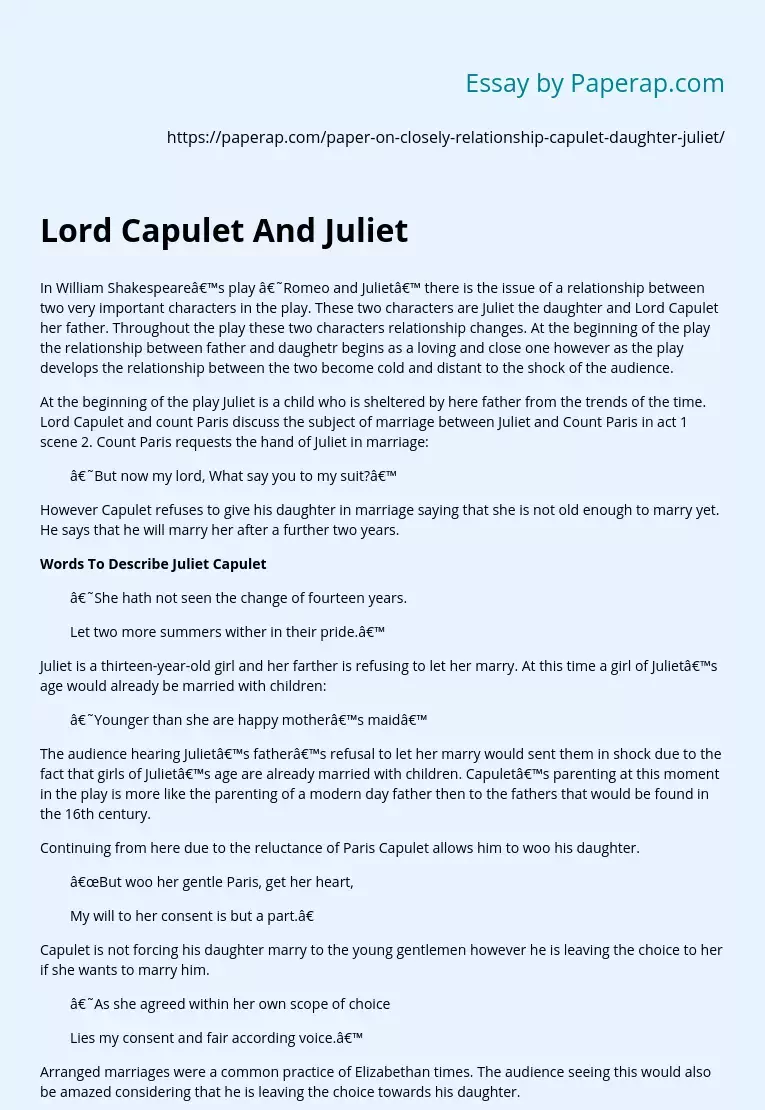Lord Capulet And Juliet
In William Shakespeare’s play ‘Romeo and Juliet’ there is the issue of a relationship between two very important characters in the play. These two characters are Juliet the daughter and Lord Capulet her father. Throughout the play these two characters relationship changes. At the beginning of the play the relationship between father and daughetr begins as a loving and close one however as the play develops the relationship between the two become cold and distant to the shock of the audience.
At the beginning of the play Juliet is a child who is sheltered by here father from the trends of the time. Lord Capulet and count Paris discuss the subject of marriage between Juliet and Count Paris in act 1 scene 2. Count Paris requests the hand of Juliet in marriage:
‘But now my lord, What say you to my suit?’
However Capulet refuses to give his daughter in marriage saying that she is not old enough to marry yet. He says that he will marry her after a further two years.
Words To Describe Juliet Capulet
‘She hath not seen the change of fourteen years.
Let two more summers wither in their pride.’
Juliet is a thirteen-year-old girl and her farther is refusing to let her marry. At this time a girl of Juliet’s age would already be married with children:
‘Younger than she are happy mother’s maid’
The audience hearing Juliet’s father’s refusal to let her marry would sent them in shock due to the fact that girls of Juliet’s age are already married with children.
Capulet’s parenting at this moment in the play is more like the parenting of a modern day father then to the fathers that would be found in the 16th century.
Continuing from here due to the reluctance of Paris Capulet allows him to woo his daughter.
“But woo her gentle Paris, get her heart,
My will to her consent is but a part.”
Capulet is not forcing his daughter marry to the young gentlemen however he is leaving the choice to her if she wants to marry him.
‘As she agreed within her own scope of choice
Lies my consent and fair according voice.’
Arranged marriages were a common practice of Elizabethan times. The audience seeing this would also be amazed considering that he is leaving the choice towards his daughter.
As the play develops it is tilted to one side when the death of Tybalt, the cousin of Juliet occurs. This causes a delay in the marriage of the Count and Juliet.
“Things have fall’n out sir, so unluckily,
That we have had no time to move our daughter.”
Capulet is saying here that due to the recent events they have failed to inform Juliet of the marriage. As Paris begins to leave he is the recalled and told by Capulet that he has decided that Juliet shall marry.
‘Of my child’s love. I think she will be ruled
In all respects by me; nay more, I doubt it not.’
The words Capulet speaks here show a huge change in his attitude towards the marriage of his daughter. From being what would be called a modern day father he has changed into a father from the type of his time.
Shakespeare has already produced a scene prior to this one showing the marriage of Romeo and Juliet. Capulet, unaware of the fact that Juliet is already a married woman will cause great problems later on and turn the farther and daughter relationship upside down. He cleverly adapts the audience into the play, which allows them to play a substantial part in the play and to know all secrets.
‘Of my child’s love. I think she will be ruled
In all respects by me; nay more, I doubt it not.’
In this scene there is also a clash between youth and age. Capulet decides that his daughter will marry Paris as soon as possible.
“Monday? Ha, Ha well Wednesday is too soon;
A Thursday let it be a’ Thursday, tell her,
Capulet hear is deciding that instead of being left to fell sorry for the death of tybalt that they should use the wedding of his daughter to start a new era. In this scene Capulet also shows a lack of parental concern for his daughter.
She shall be married to this noble earl.
Will you be ready? Do you like this haste?
Capulet’s use of language indicates more concern for his own social status and material comfort which is safer for him then to think of the recent events that lrad to the death of Tyblt.
In act 3 scene 5, Juliet refuses to marry Paris unaware of the fact that she is already married he is surprised at her refusal as he feels he has arranged a fantastic marriage.
He therefore questions his wife lady Capulet:
How will she none? Doth she not give us thanks?
Is she not proud? Doth she not count her blessed,
The audience hearing capulet’s words will be complient to what he is saying. The fact that Juliet is refusing marriage to a ‘gallant, young, noble gentleman’ causes him to lose his temper which is also evident in the first seen at the market. Juliet rejects all the loving attention that she has received from her father although she has very little say in the outcome. Capulet uses Juliet’s youth in order to mock her reluctance not to marry Count Paris.
Lord Capulet And Juliet. (2019, Dec 05). Retrieved from https://paperap.com/paper-on-closely-relationship-capulet-daughter-juliet/

